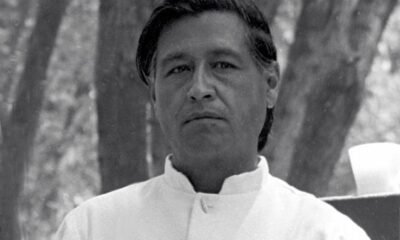arts_culture
Tucson Author Richard Grant Unveils Captivating New Book on Arizona’s Rich Tapestry

Richard Grant, a seasoned author, has made Tucson his primary residence after a diverse childhood across Malaysia, Kuwait, and London. He initially moved to Tucson in the early 1990s, drawn by the warmer climate compared to Santa Fe. Grant has crafted a notable freelance writing career for prestigious publications like Esquire and Men’s Journal, alongside authoring impactful books such as “American Nomads” and “God’s Middle Finger,” chronicling his adventures through Mexico’s Sierra Madre Occidental.
After a brief period in New York City and a relocation to Mississippi, Grant returned to Tucson in 2020 with his wife Mariah and their daughter Isobel. His latest work, “A Race to the Bottom of Crazy: Dispatches from Arizona,” is set for release on September 17. The book merges explorations of Arizona’s natural wonders and political landscape with personal reflections on family life. A celebratory book release party will take place at Moto Sonora from 5 to 7 p.m. on the same day.
The title of Grant’s new book emerged from a conversation with Maricopa County Supervisor Bill Gates, who spoke about the Republican Party’s descent into conspiracy theories. Grant connected this notion to Arizona’s rural water laws, where misuse of resources feels akin to a downward spiral. This revelation inspired the book’s title, signifying a dual exploration of political and environmental challenges.
Returning to Tucson after a decade brought noticeable changes. Grant observed deteriorating air quality, rising living costs, and a shift in local attitudes, including increased aggression in driving. The city, once known for its affordability and tranquility, felt transformed by a population surge and changing social dynamics.
The allure of Tucson’s outdoors significantly influenced Grant’s decision to return, as he aims to share Arizona’s natural beauty with his daughter. Nostalgia for the local cuisine and reunions with old friends further cemented his desire to settle back in a place he considers home.
Fatherhood has reshaped Grant’s perspective on life and risk. Where once he pursued exhilarating adventures in dangerous locales, he now prioritizes safety and stability. The exhilarating thrill of adventure still occasionally calls to him, yet his family duties remain his foremost commitment.
In reflecting on his journey, Grant acknowledges the mentorship of Tucson journalist Chuck Bowden, whose influence helped him take his writing seriously. Grant credits Bowden with instilling a respect for literature that inspired his own writing endeavors.
While researching his book, Grant engaged with notable political figures, including radical Republicans like former Oro Valley lawmaker Mark Finchem. He came away with insights into the complexities of their beliefs, recognizing the importance of personal connections in understanding political differences.
Grant’s candidness about personal experiences throughout the book posed a challenge. He expressed apprehension about divulging intimate details of his life, making it clear that he prefers to save such vulnerabilities for a single work rather than rehashing them in future writings.
Ultimately, Grant hopes readers find his book both informative and entertaining. He aims to capture the multifaceted essence of Arizona, portraying its beauty and chaos in an engaging narrative. The book promises a comprehensive exploration of the state, hoping to leave readers with a vivid sense of both place and experience.


![Maricopa police arrested Jared Lee Staats, 38, at a Maricopa Circle K on March 26 after officers saw he had a warrant for his arrest. [Pinal County Sheriff's Office]](https://arizonanews.org/wp-content/uploads/2025/04/Tucson-Fugitive-Previously-Accused-of-Human-Smuggling-Captured-at-Maricopa-400x240.jpg)
![Maricopa police arrested Jared Lee Staats, 38, at a Maricopa Circle K on March 26 after officers saw he had a warrant for his arrest. [Pinal County Sheriff's Office]](https://arizonanews.org/wp-content/uploads/2025/04/Tucson-Fugitive-Previously-Accused-of-Human-Smuggling-Captured-at-Maricopa-80x80.jpg)














